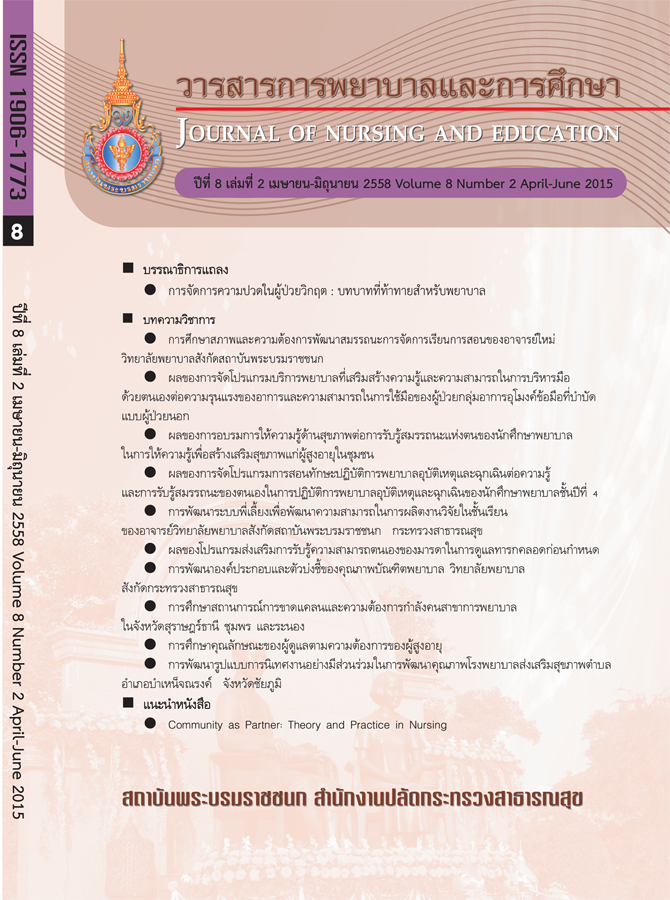ผลการอบรมการให้ความรู้ด้านสุขภาพต่อการรับรู้สมรรถนะ แห่งตนของนักศึกษาพยาบาล ในการให้ความรู้เพื่อสร้างเสริม สุขภาพแก่ผู้สูงอายุในชุมชน*
คำสำคัญ:
Self-efficacy, Health education, Satisfaction, Older adultsบทคัดย่อ
ทคัดย่อ
การให้ความรู้ด้านสุขภาพเป็นส่วนหนึ่งของกิจกรรมการสร้างเสริมสุขภาพ ถึงแม้ว่านักศึกษาพยาบาลจะมีทัศนคติเชิงบวกต่อการให้ความรู้ด้านสุขภาพแก่ผู้ป่วย/ผู้รับบริการ แต่หลายๆ การศึกษาที่ผ่านมาระบุว่านักศึกษาขาดความมั่นใจในการปฏิบัติโดยเฉพาะการประยุกต์ความรู้เกี่ยวกับการลดความเสี่ยงต่อการเกิดโรคไปใช้ในการให้ความรู้ด้านสุขภาพ การศึกษาวิจัยแบบกึ่งทดลองชนิดหนึ่งกลุ่มวัดก่อนและหลัง ครั้งนี้มีวัตถุประสงค์เพื่อศึกษาผลของการอบรมให้ความรู้ด้านสุขภาพ แก่นักศึกษาพยาบาลต่อการรับรู้สมรรถนะแห่งตนของนักศึกษาในการให้ความรู้เพื่อสร้างเสริมสุขภาพแก่ผู้สูงอายุในชุมชนโดยกลุ่มตัวอย่างเป็นนักศึกษาพยาบาล วิทยาลัยพยาบาลบรมราชชนนี เชียงใหม่ ชั้นปีที่ 2 ที่ฝึกปฏิบัติในวิชาปฏิบัติการพยาบาลสร้างเสริมสุขภาพและป้องกันการเจ็บป่วย ภาคเรียนที่ 2 ปีการศึกษา 2554 ที่ได้รับความรู้เกี่ยวกับกระบวนการให้ความรู้ด้านสุขภาพแก่นักศึกษา การแสดงบทบาทสมมติการให้ความรู้แก่ผู้สูงอายุ การอภิปรายและแลกเปลี่ยนความรู้ การให้ข้อมูลย้อนกลับ รวมทั้งให้คำชี้แนะ และให้กำลังใจในการปฏิบัติของนักศึกษา ได้กลุ่มตัวอย่างโดยการสุ่มอย่างง่าย จำนวน 40 คน เครื่องมือที่ใช้ในการรวบรวมข้อมูล ได้แก่แบบวัดการรับรู้สมรรถนะแห่งตนในการให้ความรู้ด้านสุขภาพแก่ผู้สูงอายุ และแบบวัดความพึงพอใจของผู้สูงอายุต่อการให้ความรู้เพื่อสร้างเสริมสุขภาพและป้องกันการเจ็บป่วยของนักศึกษา ซึ่งมีค่าความเที่ยงสัมประสิทธิ์แอลฟาของครอนบาค (Cronbach’s alpha coefficient) เท่ากับ 0.82 และ 0.75 ตามลำดับ สถิติที่ใช้ในการวิเคราะห์ข้อมูลได้แก่ สถิติเชิงพรรณนาและการวิเคราะห์ความแปรปรวนแบบทางเดียวเมื่อมีการวัดซ้ำและทดสอบรายคู่โดยใช้สถิติ Bonferroni
ผลการวิจัยพบว่าหลังการอบรมและภายหลังสิ้นสุดการฝึกปฏิบัติในรายวิชาปฏิบัติการพยาบาลสร้างเสริมสุขภาพและป้องกันการเจ็บป่วย นักศึกษาพยาบาลมีคะแนนเฉลี่ยการรับรู้สมรรถนะแห่งตนในการให้ความรู้เพื่อสร้างเสริมสุขภาพแก่ผู้สูงอายุ สูงกว่าก่อนเข้าร่วมโปรแกรมการอบรม อย่างมีนัยสำคัญทางสถิติ (Wilks’ Lambda = .03, F (2, 38) = 673.17, p <.0005, multivariate partial et a squared = .97) ผู้สูงอายุในชุมชนมีความพึงพอใจต่อการให้ความรู้ของนักศึกษาอยู่ในระดับพึงพอใจมาก ( = 4.17; SD = 0.24) เห็นได้ว่า การอบรมกระบวนการให้ความรู้ด้านสุขภาพแก่นักศึกษาโดยส่งเสริมการรับรู้สมรรถนะแห่งตนในการให้ความรู้เพื่อสร้างเสริมสุขภาพแก่ผู้สูงอายุ ก่อนที่นักศึกษาจะฝึกปฏิบัติจริงในชุมชน เป็นวิธีการที่มีประโยชน์ ช่วยให้นักศึกษามีความมั่นใจในศักยภาพตนเอง และสามารถให้ความรู้เพื่อสร้างเสริมสุขภาพแก่ผู้สูงอายุได้อย่างมีประสิทธิภาพ ดังนั้นการจัดการเรียนการสอนที่มีการส่งเสริมสมรรถนะแห่งตนจากแหล่งข้อมูล 4 แหล่งควรถูกนำไปประยุกต์ใช้ ในการส่งเสริมการรับรู้สมรรถนะแห่งตนของนักศึกษาในด้านอื่นๆ ต่อไป
คำสำคัญ : การรับรู้ความสามารถของตนเอง การให้ความรู้ทางสุขภาพ ความพึงพอใจ ผู้สูงอายุ
Abstract
Health education can be considered as an important part of the health promotion practices. Although nursing students have positive attitudes toward health education practice, previous research studies report a lack of confidence in their application of the knowledge about risk reduction to patient education. The aim of this one group pre-test/post-test design was to examine the influence of a patient education training program on nursing students’ self-efficacy in performing health promotion teaching to older adults living in the community. The training was designed specifically to provide the 40 nursing students in the second year of the Bachelor’s of Nursing Science degree in Boromarajonani College of Nursing, Chiangmai with knowledge regarding health education and to enhance their
self-efficacy in performing health promotion teaching to older adults living in the communities. Teaching and learning activities used in this training programme included role-playing, group
discussion, feedback, and verbal persuasion. The sample were randomly selected from a nursing practicum course for health promotion and prevention of the academic year 2011. The instruments were the self-efficacy questionnaire and the older people’s satisfaction with nursing students’
educational activities. Both instruments were approved by the experts. The Cronbach’s alpha was 0.82 and 0.75 respectively. The descriptive, repeated measures ANOVA and Bonferroni were used to analyze the data.
The results revealed that the students’ self-efficacy in performing health promotion education increased significantly from pre-test to the end-of-course test (Wilks’ Lambda =.03, F (2, 38 ) = 673.17, p <.0005, multivariate partial eta squared = 0.97). Additionally, this study found that older people reported high level of satisfaction with the nursing students’ educational activities (= 4.17; SD = 0.24). The results indicated that a patient education training program can improve nursing
students’ confidence in providing health education to older adults living in the community.
This suggests that teaching and learning activities from the four sources of self-efficacy information should be applied to enhance other student’s self-efficacy.
Keywords : Self-efficacy, Health education, Satisfaction, Older adults





